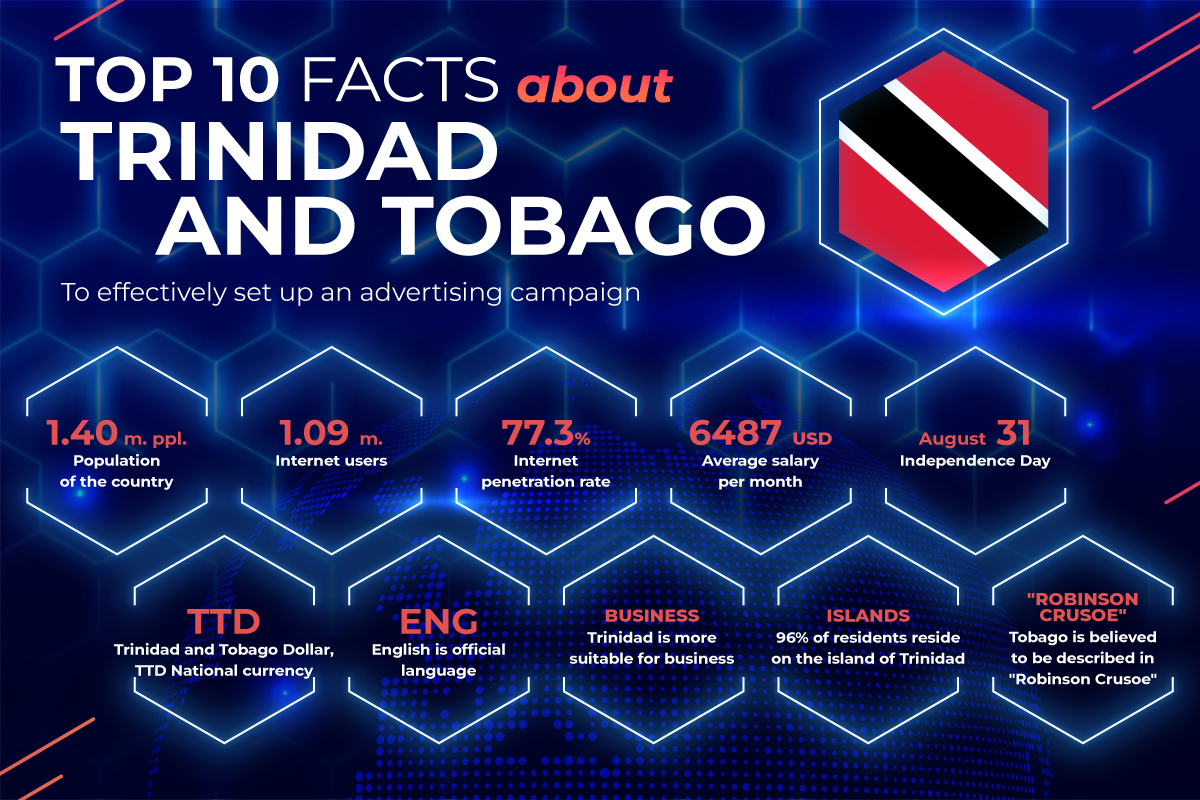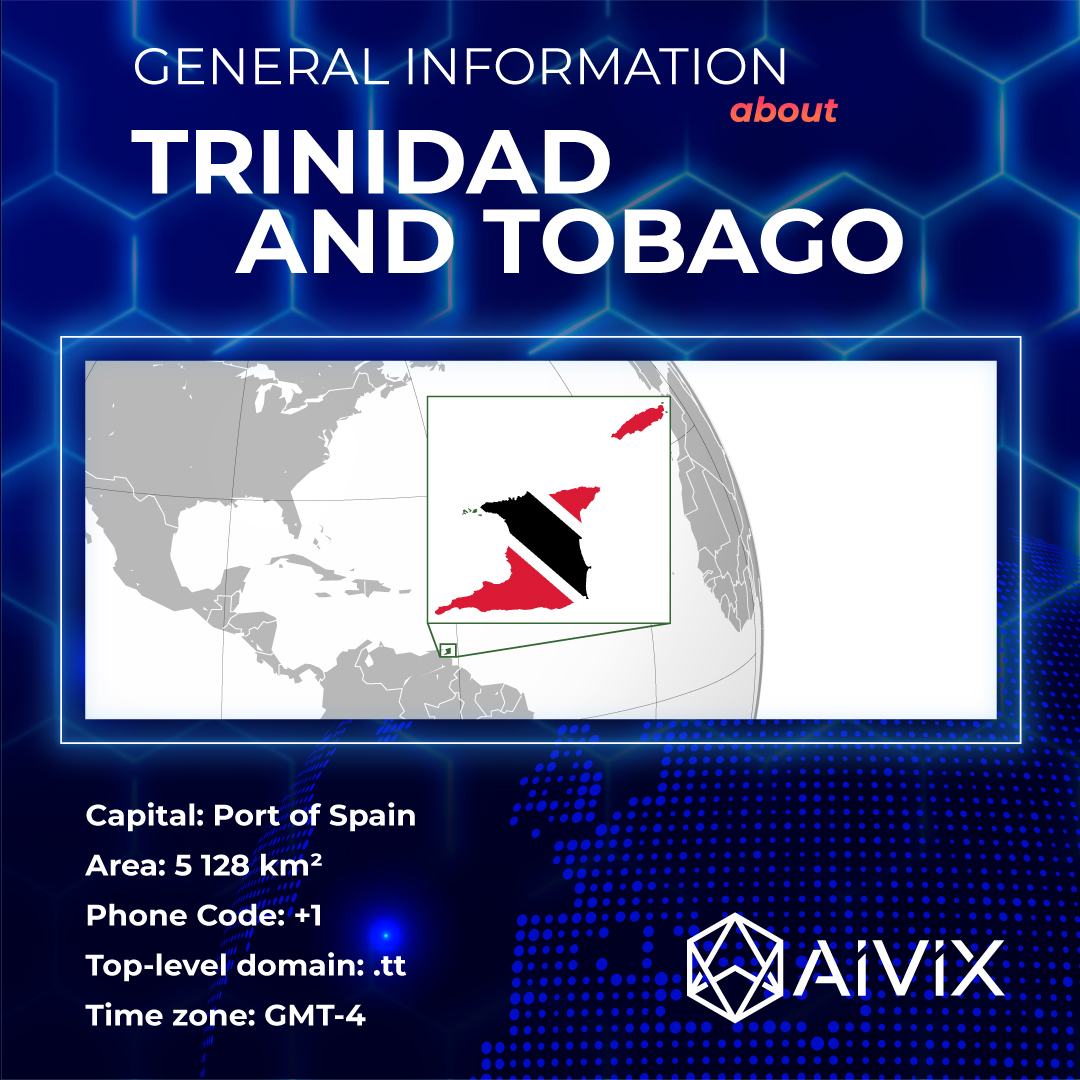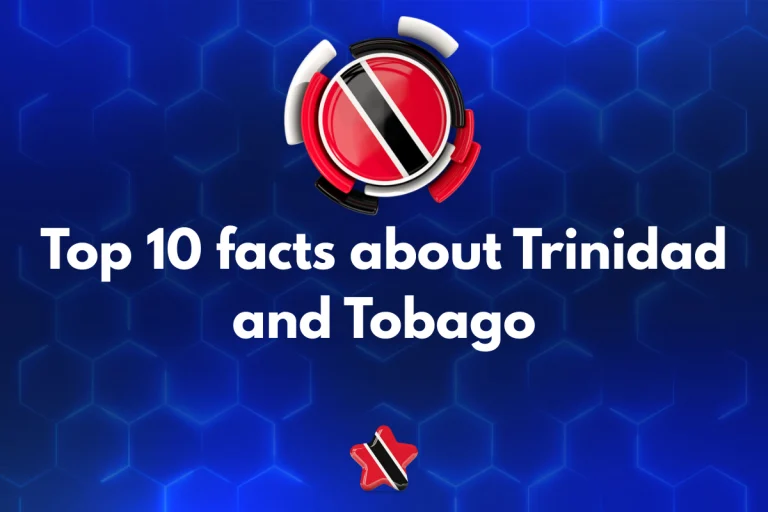
Trinidad and Tobago a small, little-known island nation in the world, placed in the Caribbean Sea. For a long time, the Republic was a British colony, which left a mark on the development of local culture and the socio-political system.
Geography and population
The island of Trinidad with an area of 4768 km² is hilly and mountainous in the northern part, and plain in other areas. The island of Tobago with an area of 298 km² is 16 times smaller and mountainous and hilly throughout its surface. Some other smaller islands are part of the territory, and the total coastline is 362 km².
The highest point in the country is located in Trinidad and is called Cerro del Aripo (940 m), while Tobago still reaches no more than 600 meters with its highest peaks.
There are very few lakes and the largest of them are artificial, even rivers and streams are not so numerous and have a short course. The largest on the island of Trinidad: are Hortuar (50 km) and Caroni (40 km).
The climate is tropical, with fairly heavy precipitation falling mainly in the summer-autumn period, the temperature difference between the hottest and coolest months is minimal and actually amounts to only 4-5 °C, with maximum fluctuations between 28 and 33 °C during the day, and at night in average around 22°C.
Trinidad and Tobago is administratively divided into 10 regions (the island of Tobago is autonomous) and 5 municipalities and has an urbanization rate of 59%, with about 2/5 of the population living in the urban area of the capital Port of Spain. The other main centers after the capital are Chaguanas (83,500 residents), San Fernando (48,800 residents), and Arima (33,600 residents).
The ethnic composition of the country is very diverse: Indians (38%) and Africans (36%) are the two largest ethnic groups, the former came to these islands to replace the latter, who were originally brought here as slaves to work on plantations. Almost of the rest of the population is mestizo (24%), with small European and Asian minorities. Consequently, the religions practiced are also different: Protestants make up 33.5%, Catholics – 21.5%, Hindus – 18% and Muslims – 5%.

Official language
The official state language of the country is English. In addition, the population can also use the local version of Creole, Indo-Aryan, and slightly Spanish. Spanish is an important foreign language here.
Currency
The national currency is called the Trinidad and Tobago dollar – TTD/ TT$.
Internet
The Internet and its availability on the islands cannot be compared with European indicators. Nevertheless, telecommunication technologies are more or less developing.
One of the most famous providers is Xfinity. What is characteristic, the cost of services is quite high – from $30 per month.
Among mobile operators, the most popular company is Digicel, which is distributed throughout the Caribbean region. Good data plans are expensive and here a 50 GB package costs about $40. There are simpler options, but in any case, a monthly connection will cost at least $30.

Economic development
Largely dependent on hydrocarbons, which make up the majority of exports and fuel the sovereign wealth fund, the country has tried to diversify the economy, focusing in particular on tourism, telecommunications, and financial activities. The main crop sold to other countries is fruits (pineapples, coconuts); among food crops, bananas, taro, and cassava are important.
The most important sector, as mentioned above, is hydrocarbons: two oil pipelines transport crude oil from the wells of Tabaquita (and southwest Trinidad) to Claxton Bay and Point Fortin, where there is also a natural gas liquefaction plant; noteworthy is the natural deposit of bitumen Pitch Lake.
Electricity generation is based on gas-fired thermal power plants. Industry includes petrochemical plants (Point-a-Pierre, Point Fortain, and La Brea), chemical plants, sugar refineries, cement plants (Claxton Bay), breweries, rum and soft drink production, and cigarettes.
An important product of the production is angostura, an alcoholic drink made from the three-leaf bark of Angostura.
The only stock exchange is located in Port of Spain. Tourist activity is concentrated, in particular, on the island of Tobago (most tourists come from the USA).
In recent years, it is the tourism sector has shown a tendency to expand. The trade balance is constantly in surplus, thanks to the export of hydrocarbons and derivatives. The US absorbs almost 45% of exports; followed by Spain, Jamaica, and the Netherlands. In addition to the United States, the main suppliers (food and consumer goods) are Brazil, Venezuela, and Colombia.
The road network is developed and efficient (8320 km2 of roads, of which more than half are paved). Port of Spain is the islands’ largest port and airport.
The system of taxation in force in Trinidad and Tobago is based on the principle of a flat rate with a tax levy proportional to the amounts taxed. Systems of this type are actually provided for both the taxation of individuals and companies. The tax administration is under the jurisdiction of the Board of Internal Revenue, which is part of the Ministry of Finance and is responsible for collecting most direct taxes (income and corporate tax, as well as tax on the oil sector).
The income of individuals living and domiciled in Trinidad and Tobago is taxed at a flat rate of 25%. The level of income up to 72,000 TTD is exempt from taxation. You can also reduce the amount of tax you pay by making various income deductions, such as college fees or living expenses. The principle of world income applies.

Job in Trinidad and Tobago
The Republic is not a country whose population can boast of high incomes. The minimum salary in 2022 is about 2,500 TTD per month, the maximum average is about 44,000 TTD.
Interestingly, one of the decisive factors in salary calculation is the age and experience of the employee: the more they are, the greater the potential salary. Even workers with five years of work experience can already claim 30% of what they usually pay novice specialists.
Accordingly, if a person has been employed in his niche for more than five years (for example, 10), his salary is 36% higher than the previous category. Men earn on average 6% more than women. However, all this strongly depends on the field of work, the specifics of a particular company.
Prices
Let’s start with the cost of renting a home. Small apartments in the center will cost about $500, but you can find offers even cheaper – prices are about the same as wages. Utilities cost about $50 per month.
Food prices in local supermarkets are similar to European ones. This is what a sample grocery basket looks like:
12 eggs – $3.5
1 liter of milk – $1.9
1 kg of chicken breast – $6
1 kg of potatoes – $1.2
1 kg of beef – $7
1 kg of rice – $1.9
To live well in this country, you need to have a salary of at least $1000.

Medicine and education
There are about 100 health centers and clinics in Trinidad and Tobago, and 8 of them are district hospitals. There are both public and private institutions, and for both types of services you need to pay, but the amounts differ significantly.
There is a public insurance system for the local population, through which patients can access the services they need. Almost everyone has such policies: with them, you can be treated for the common cold by a therapist or receive more serious help. There is also maternity coverage.
The traveler should remember that infectious disease outbreaks periodically occur on the island. When planning a trip, it is better to buy an international insurance policy in case of surprises.
Education in the country is also free and compulsory. Children must go to school until at least 16 years of age, after which they can either continue their education or go to work. The literacy rate is quite high.
There are also several institutions of higher education in the country. First of all, the University of the West Indies at St Augustine in Tunapuna, as well as the University of the South Caribbean. Young people here can master the main humanitarian and technical specialties; among foreigners, these universities are not popular.
Working days and holidays
January, 1st – New Year
February, 28 – Carnival
March, 30 – Baptist Spiritual Deliverance Day
April-May – Easter holidays
August, 1st – Liberation Day
August, 31st – Independence Day
September, 24 – Republic Day
December, 25 – Christmas
Mentality
The inhabitants of the island state are very cheerful and loving days off. They live at a pace typical for the region – not in a hurry, which is also reflected in the provision of services.
Love for the holidays forces the locals to celebrate magnificently on any occasion – therefore, even non-believers walk a number of religious holidays. It is also worth taking a look at the local carnivals.
Family values are of great importance on the islands. Public behavior is usually modest, pestering tourists is considered impolite.

Cryptocurrency
Cryptocurrencies are not prohibited in this region. However, local regulators do not encourage them too much, outlining the following risks of using digital assets:
– Liquidity risks for investors using the services of unregulated exchanges;
– Insufficient amount of information about investment campaigns, including ICO;
– A large space for fraud, which is associated with the specific properties of cryptocurrency.
Cryptocurrency also cannot be bought in local banks, except for one – the Republican Bank.
In February, the central bank announced that it was considering piloting a national cryptocurrency, the so-called CBDC, by mid-2022. However, so far this is not the case.
Advertising market
Marketing agency Hootsuite annually releases analytical reports on digital advertising markets in different countries. Here are some things to keep in mind for marketers planning to work in Trinidad and Tobago:
1. The most popular digital medium among the local population is Google and YouTube;
2. The most popular social network is Facebook. Potential advertising reach in it was almost 65% in 2021 and continues to increase. At the same time, more than 80% of users view the feed using mobile devices;
3. Instagram follows closely behind Facebook in terms of popularity but covers a younger demographic, this is also worth considering.
The situation in the e-commerce environment is not very favorable. One of the major problems hindering online shopping is the inability to do so: the local population has virtually no access to online payments using debit cards, and only 16% of local residents of adult age have credit cards. Online shopping is carried out by only 20% of the population.
Conclusion
Trinidad and Tobago a little-known but colorful country. It stands out primarily for its nature and culture and is worth visiting at least once in a lifetime.


0 Comments